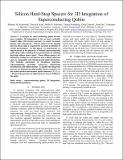Silicon Hard-Stop Spacers for 3D Integration of Superconducting Qubits
Author(s)
Niedzielski, Bethany M; Kim, David K.; Schwartz, Mollie E.; Rosenberg, Danna; Calusine, Greg; Das, Rabi; Melville, Alexander J.; Plant, Jason J.; Racz, Livia; Yoder, Jonilyn Longenecker; Ruth-Yost, Donna; Oliver, William D; ... Show more Show less
DownloadSubmitted version (1.940Mb)
Open Access Policy
Open Access Policy
Creative Commons Attribution-Noncommercial-Share Alike
Terms of use
Metadata
Show full item recordAbstract
© 2019 IEEE. As designs for superconducting qubits become more complex, 3D integration of two or more vertically bonded chips will become necessary to enable increased density and connectivity. Precise control of the spacing between these chips is required for accurate prediction of circuit performance. In this paper, we demonstrate an improvement in the planarity of bonded superconducting qubit chips while retaining device performance by utilizing hard-stop silicon spacer posts. These silicon spacers are defined by etching several microns into a silicon substrate and are compatible with 3D-integrated qubit fabrication. This includes fabrication of Josephson junctions, superconducting air-bridge crossovers, underbump metallization and indium bumps. To qualify the integrated process, we demonstrate high-quality factor resonators on the etched surface and measure qubit coherence (T1, T2,echo > 40 μs) in the presence of silicon posts as near as 350 μm to the qubit.
Date issued
2019-12Department
Lincoln Laboratory; Massachusetts Institute of Technology. Department of Electrical Engineering and Computer ScienceJournal
Technical Digest - International Electron Devices Meeting, IEDM
Publisher
Institute of Electrical and Electronics Engineers (IEEE)
Citation
2019. "Silicon Hard-Stop Spacers for 3D Integration of Superconducting Qubits." Technical Digest - International Electron Devices Meeting, IEDM, 2019-December.
Version: Original manuscript